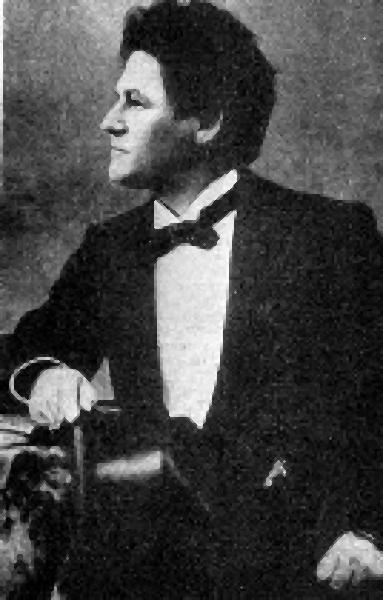Konstantin Mikhajlov-Stojan
Konstantin Ivanovich Mikhajlov-Stojan was born 25 March (6 April), 1853 in the region of Bessarabia, today in Moldova, then in the
Tsarist Russia, into a poor family of immigrants from Elhovo, Bulgaria. There is a funny divergence on his real name: Bulgarian
sources say his name was Mikhajlov, and he added the typical Bulgarian (and not at all Russian) name Stojan so as to emphasize his
Bulgarian origin. Russian sources state his real name was Stojan, and Mikhajlov was a pseudonym...
When he was young, he learned Bulgarian folk music through the songs of his grandmother.
During his secondary education in Odessa, he developed his singing talent and interest in music when singing as a soloist in
the bishop's choir and the choir of the university church. He graduated in 1872, but due to lack of funds he did not go to
the Saint Petersburg Conservatory until 1876 (or 1879 according to other sources), and meanwhile earned his living as a
teacher in Elisavetgrad (today Kropyvnytskyj).
In 1881, he moved to Simferopol in the Crimea peninsula and sang in an operetta troupe first as a chorister, then as a soloist,
making his debut as Paris and Pygmalion in "Die schöne Galathee" by Franz von Suppé. He built his career during the
following seven years in several opera ensembles. In 1888, he won a competition to be a soloist at the Bolshoj, where he sang until
1890, and again 1897–1899. Between 1890 and 1897, he toured with the opera company of Ippolit Prjanishnikov, as well as
with other smaller companies.
In the summer of 1899, Mikhajlov-Stojan visited Bulgaria for the first time, and immediately established contacts with
musical circles. Together with the pianist Mara Cheren and the singer Katja Stojanova, he gave concerts in Vratsa, Vidin, Lom and
Ruse. He made proposals to the Ministry of Education to create a professional opera company, but the idea was not accepted.
Therefore in autumn, Mikhajlov-Stojan returned to Russia, where he remained until 1907. In early 1902 in Nizhnij Novgorod, he
partnered Fjodor Shaljapin. In 1903, he was a guest soloist at the opera house in Helsinki. In September 1905, he was appointed
director of the music school of Rostov-on-Don.
Returning to Bulgaria in the summer of 1907, Mikhajlov-Stojan toured Bulgaria with opera singer Ivan Vulpe, a native of
Bessarabia like him, and his wife, Bogdana Gjuzeleva-Vulpe. The success of the three singers drew attention to the initiative for
the establishment of a Bulgarian opera company. For this purpose, Mikhajlov-Stojan wrote his book "On the issue of establishing a
Bulgarian folk opera" containing polemic articles, letters, critical reviews and other documentary materials substantiating the need
for such a cultural institution. So at the end of 1908, there was a Bulgarian opera and the first performance was on October 18.
Until the end of his life, Konstantin Mikhajlov-Stojan was its director and performer in many productions.
Mikhajlov-Stojan is also the author of vocal pedagogical studies and biographical essays on musicians and singers. In addition to
opera, he contributed to the Bulgarian music and folklore, and recorded numerous folk songs.
Reference 1, Reference 2, Reference 3
Konstantin Mikhailov-Stojan holds a very important role in the development of opera in Bulgaria. Born in 1851 in Russia,
he received his
training at the
conservatory of St. Petersburg. After appearing with an operetta company, he was engaged by the Bolshoj Theater in Moscow during
1888–1890
and 1897–1898. During the season of 1893/94, he appeared at the Imperial Opera House of St. Petersburg. Successful
appearances followed
in Kiev, Odessa and Vilnius, where in addition to singing he taught voice. Following this, he became a professor and then director
of the
conservatory of Rostov, at the same time singing opera in Smolensk. Major roles in his career included German (Pikovaja dama), Lenskij,
Prince Igor,
Alfredo, Tannhäuser and Faust. In 1908, he came to Bulgaria to assume the leadership of the Bulgarska Operna Drushba (Bulgarian
Opera Society), in addition to performing with the Sofia National Opera.
Through his efforts the opera life in Bulgaria began to flourish. In 1910, he was responsible for the premiere of the first Bulgarian opera,
Siromakhkinja by Emanuil Manolov. Under his management, other operas by Bulgarian composers Georgi Atanasov and Dimiter Hadjigeorgiev
were performed.
Konstantin Mikhajlov-Stojan died on the 14th of June 1914, after only six years with the Sofia National Opera.
Source
In RA format
If you wonder why he sang in Macedonian, well, the distinction between Bulgarian
and Macedonian is more a matter of politics than of linguistics – it's basically the same language, although contemporary North
Macedonia is anxious to present their regional dialects as an autonomous language.
I wish to thank Vladimir Efimenko for the recording and picture.
|
